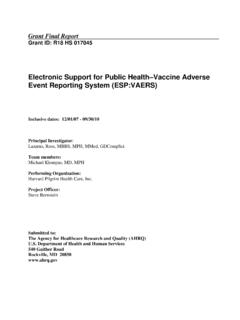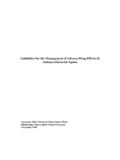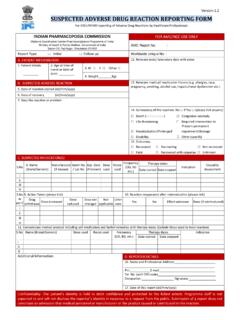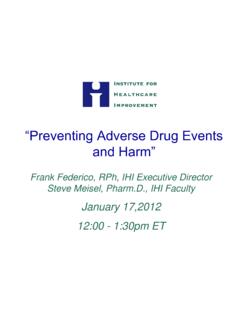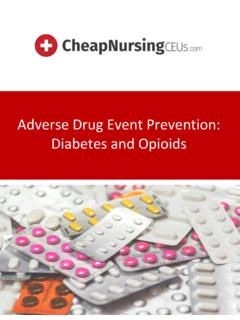Search results with tag "Adverse drug"
Electronic Support for Public Health–Vaccine Adverse Event ...
digital.ahrq.govAdverse events from drugs and vaccines are common, but underreported. Although 25% of ambulatory patients experience an adverse drug event, less than 0.3% of all adverse drug events and 1-13% of serious events are reported to the Food and Drug Administration (FDA). Likewise, fewer than 1% of vaccine adverse events are reported.
Guidelines for the Management of Adverse Drug Effects of ...
www.uphs.upenn.eduSection I: Most Common Adverse Drug Effects Listed by Adverse Effect 3-18 Dermatologic Adverse Effects 4-6 cutaneous “flushing” reactions 4 hypersensitivity reactions 5-6 Gastrointestinal Adverse Effects 7-13 nausea/vomiting 7-9 diarrhea 10-11 hepatotoxicity 12-13 Miscellaneous Adverse Effects 14-18 arthalgias (joint pain) 14-15 influenza ...
SUSPECTED ADVERSE DRUG REACTION REPORTING FORM
www.cdsco.nic.inSUSPECTED ADVERSE DRUG REACTION REPORTING FORM For VOLUNTARY reporting of Adverse Drug Reactions by healthcare professionals CDSCO Central Drugs Standard Control ...
National Action Plan for Adverse Drug Event Prevention
health.govprevention of adverse drug events among three primary drug classes: anticoagulants, diabetes agents, and opioids. The ADE Action Plan is intended to encourage nationwide efforts to coordinate Federal resources and activities that will reduce preventable adverse drug events and increase awareness of the importance of medication safety.
Reporting adverse drug reactions
www.isoponline.orgreporting of adverse drug reactions (ADRs) is an important mechanism for post-marketing surveillance of medicines and is vital for maintaining drug safety. In 1996 the BMA’s Board of Science published Reporting adverse drug reactions – a policy document1, which discussed the different structures in place within the UK for reporting ADRs.
Technology to prevent adverse drug events
actionade.orgdrug safety and efectiveness, and adverse drug event surveillance. Together with her team, she has developed interventions to improve the recognition and treatment of patients afected by adverse drug events. Corinne practices Emergency Medicine at Vancouver General Hospital. Ellen Balka Ellen Balka, PhD, is a Professor in the School
SUSPECTED ADVERSE DRUG REACTION REPORTING FORM
cdsco.gov.inDuly filled Suspected Adverse Drug Reaction Reporting Form can be send to the nearest Adverse Drug Reaction Monitoring Centre (AMC) or directly to the National Coordination Centre (NCC). Call on Helpline (Toll Free) 1800 180 3024 to report ADRs.
―Preventing Adverse Drug Events and Harm‖ - IHI
www.ihi.org―Preventing Adverse Drug Events and Harm‖ ... provided training in adverse drug event management and prevention. Currently, Smetzer is one of the authors and editors of four ISMP newsletters—one for hospitals, one for nurses, one for community pharmacies, and one for
Pharmacovigilance guidelines Nov 2009 - Botswana
www.moh.gov.bw5 2 REPORTING OF ADVERSE DRUG REACTION Spontaneous reporting of suspected adverse drug reactions is the major source of information in pharmacovigilance.
Reported suspected adverse reactions to coronavirus vaccines
legemiddelverket.noReported suspected adverse reactions to ... The ADR (adverse drug reaction) reports do not provide a basis for revising the current recommendations regarding the use of the coronavirus vaccines. The benefits of administering the vaccine are considered to outweigh any possible risks.
What to include in your Yellow Card of an adverse drug ...
assets.publishing.service.gov.ukfor follow-up. However, do not delay reporting just because some details are not known. MHRA will contact you additional information is required. See Assessing causality of adverse drug reactions (PDF, 104KB, 2 pages) You should anonymise any …
5.3.6 CUMULATIVE ANALYSIS OF POST …
drtrozzi.orgreported from clinical studies regardless of causality assessment. The limitations of post-marketing adverse drug event reporting should be considered when interpreting these data: • Reports are submitted voluntarily, and the magnitude of underreporting is unknown.
Medicines Control Council - sahpra.org.za
www.sahpra.org.zaRegistration of Medicines Reporting of Adverse Drug Reactions 2.11_ADR_reporting_May03_v1_2.doc December 2012 Page 4 of 18 1 INTRODUCTION The following guidelines pertain to Regulations 34 and 37 of Act 90 of 1997 [the Medicines and Related
Adverse Drug Events vs Adverse Drug Reaction
www2.gov.bc.caAdverse Drug Reaction Defines the type of Adverse Drug Event. This informs users of the most appropriate clinical intervention. For example, a patient arrives in the ER experiencing seizures due to not taking their phenytoin. This would be documented as an ADE due to non-compliance, the expectation is that clinicians will encourage the
Adverse Drug Reactions - ACCP
www.accp.comAn adverse drug reaction (ADR) is an unwanted, unde - sirable effect of a medication that occurs during usual clinical use. Adverse drug reactions occur almost daily in health care institutions and can adversely affect a patient’s quality of life, often causing considerable morbidity and mortality. Much attention has been given to identifying
Adverse Drug Event Prevention: Diabetes and Opioids
storage.googleapis.comAdverse Drug Events: Magnitude of the Problem ADE Prevention Is a Patient Safety Priority An adverse drug event has been defined by the Institute of Medicine as “an injury resulting from
Adverse Drug Event (ADE) Prevention Roadmap
www.solutionsforpatientsafety.orgcontrast, preventing pediatric adverse drug events involves many different processes and requires the coordinated interface of people, technology and processes, as well as a commitment to continuous learning and improvement over time.
Similar queries
Adverse, Adverse Drug, Drug, Reactions, SUSPECTED ADVERSE DRUG REACTION REPORTING FORM, Reporting, Action Plan, Adverse drug events, Reporting adverse drug, Technology to prevent adverse drug events, Drug safety, Monitoring Centre, The National, Centre, Preventing Adverse Drug Events, Pharmacovigilance guidelines, Adverse drug reactions, Suspected adverse reactions, To include in your Yellow Card, Causality assessment, Guidelines, Adverse Drug Event Prevention: Diabetes and Opioids, Preventing
